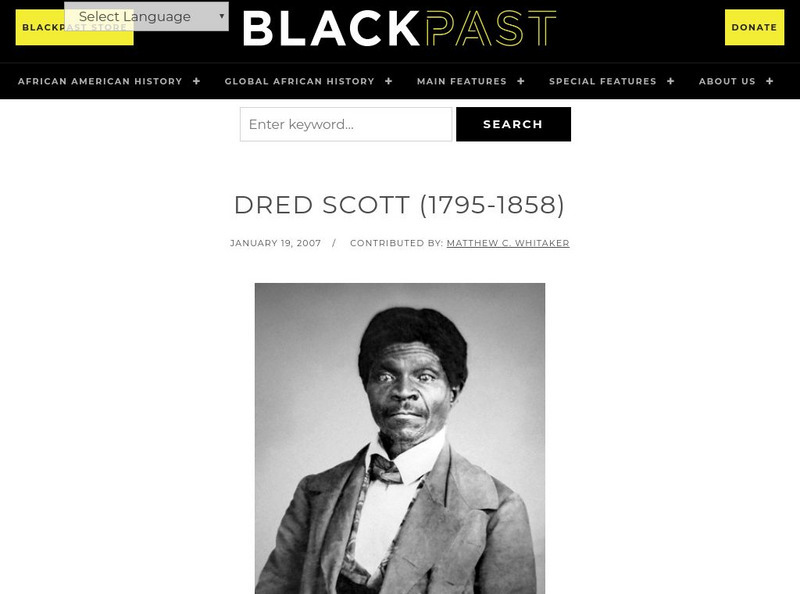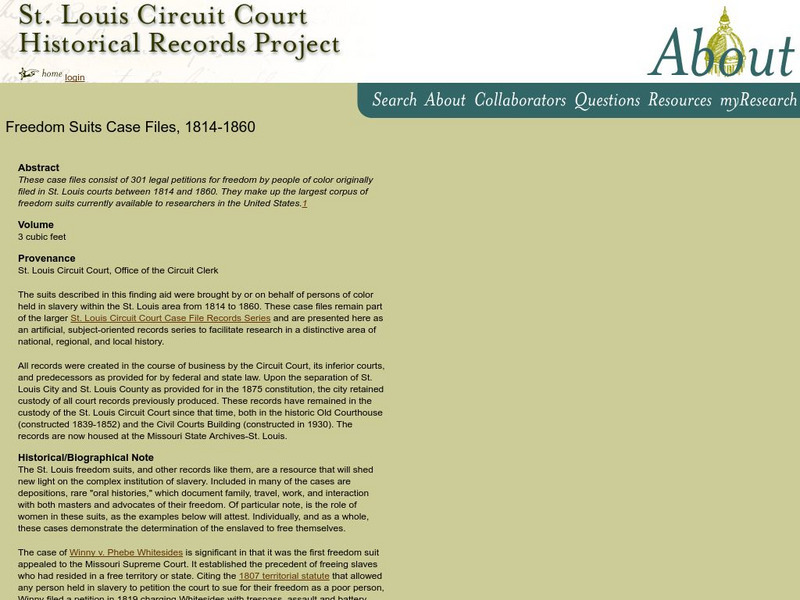State Bar of Texas
Dred Scott v. Sandford
Who decides someone is not a real person? Scholars investigate the Dred Scott v. Sandford court case which deals directly with slavery and citizenship. After viewing a short video clip, classmates work in pairs to assess and discuss the...
Curated OER
The Dred Scott Case (1857)
Students read and discuss Dred Scott v. Sandford Supreme Court case, describe in writing Constitutional principles and results of case, explain how Supreme Court decision may have helped further tensions between states, and answer...
Curated OER
The Dred Scott Decision
In this reading comprehension worksheet, students read a passage about the Dred Scott Decision and answer questions about what they read. Students write 4 short answers.
Curated OER
The Trial of Dred Scott
Students study the trial of Dred Scott. They investigate the New York Times reporter and simulate writing about the trial for a newspaper. They identify the 5Ws from the play using a graphic organizer and present their findings to the...
Carolina K-12
Plessy v. Ferguson & the Roots of Segregation
How far in the past do the roots of Jim Crow and segregation extend? Young historians closely consider this question using detailed PowerPoint slides as a basis for discussion rather than lecture, culminating in an activity where class...
Curated OER
Underground Railroad
Eighth graders explore the Underground Railroad. For this American History lesson, 8th graders create a song about the railroad. Students analyze various symbols used during the Underground Railroad.
Museum of Tolerance
Making Lemonade: Responding to Oppression in Empowering Ways
An activity focused on tolerance encourages class members to consider how they might respond when they or someone else is the target of oppression and discrimination. After researching how some key figures responded to the...
Library of Virginia
An Overview of American Slavery
The final lesson in a unit study of American slavery asks young historians to synthesize what they have learned about how slavery in America changed over time. Revisiting the many documents they have examined, they consider the economic,...
Alabama Learning Exchange
Newscast on the Battles of the Ironclad Ships
Fifth graders create multi-media newscasts based on their knowledge of Civil War battles of the ironclad ships.
Curated OER
Civil War and Reconstruction
Students examine the differences between the North and South during the pre-Civil War era. In this Civil War era lesson plan, students spent 7 days looking at things that were different between the Union and Confederate state before the...
Curated OER
Road to War Assessment
In this American Civil War worksheet, students respond to 20 short answer, multiple choice, and true or false questions about the events that led to the outbreak of war.
Curated OER
The Deadly Equilibrium Lesson Plan
Students read a narrative "The Domestic Slave Trade" and answer questions about states' slave trading. They read another narrative "Runaway Journey" and answer questions about runaway slaves. They discuss the impact of the slave trade on...
Curated OER
Lincoln-Douglas Debates of 1858
Students examine the transcripts of the 1858 Lincoln-Douglas debates and create a platform for each candidate in the 1858 Senate race. They utilize the candidates' arguments to explore the historical and political impact.
US National Archives
Docsteach: From Dred Scott to Civil Rights Act of 1875: Eighteen Years of Change
In 1857, the U.S. Supreme Court ruled in the Dred Scott decision that African-Americans were not citizens of the United States. Yet within 18 years, Black Americans would not only have citizenship, but would be guaranteed the right to...
PBS
Wnet: Thirteen: The Supreme Court: Landmark Cases: Dred Scott v. Sandford (1857)
PBS features a summary of the landmark Supreme Court case of Dred Scott v. Sanford which ruled that African Americans are not American citizens, and therefore could not sue in federal court. Decision written by Chief Justice Roger B. Taney.
Black Past
Black Past: Dred Scott
This encyclopedia article is a brief biography of Dred Scott, the slave who sued for his freedom. His case went all the way to the U.S. Supreme Court, where he lost.
Library of Congress
Loc: Slaves and the Courts
Slaves and the Courts, 1740-1860 contains just over a hundred pamphlets and books (published between 1772 and 1889) concerning the difficult and troubling experiences of African and African-American slaves in the American colonies and...
Other
National Civil Rights Museum
Get a glimpse of what is housed in the National Civil Rights Museum in Memphis, Tennessee. The interactive tour highlights the struggle and introduces key historical figures such as Sojourner Truth, Nat Turner, Dred Scott, and Frederick...
Other
Missouri State Archives: Freedom Suits Case Files, 1814 1860
An exhaustive, searchable website with original court records on 300 legal petitions for freedom by people of color, originally filed in St. Louis courts between 1814 and 1860.
Curated OER
Educational Technology Clearinghouse: Clip Art Etc: Roger Brooke Taney
(1777-1864) "Chief Justice of the United States Supreme Court, who gave the decision in the Dred Scott Case." -Foster, 1921





















